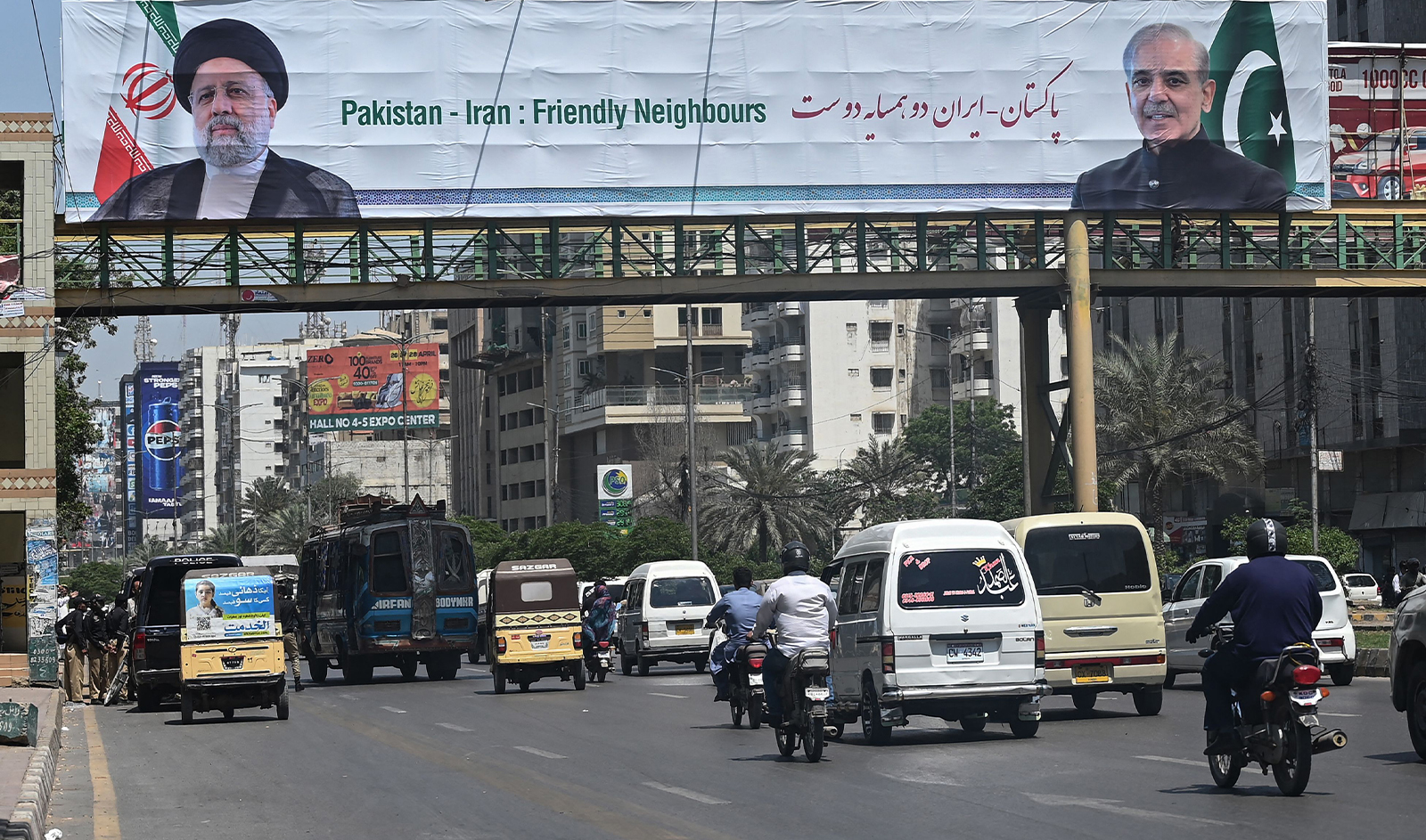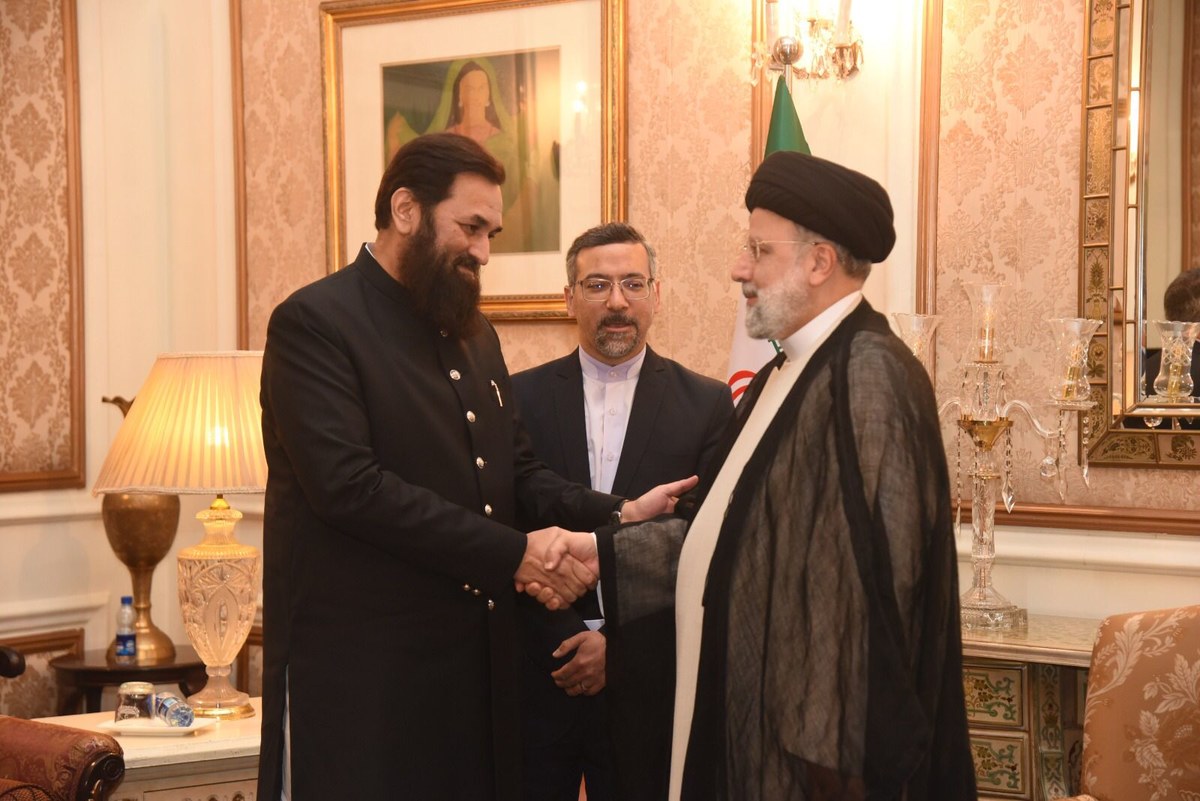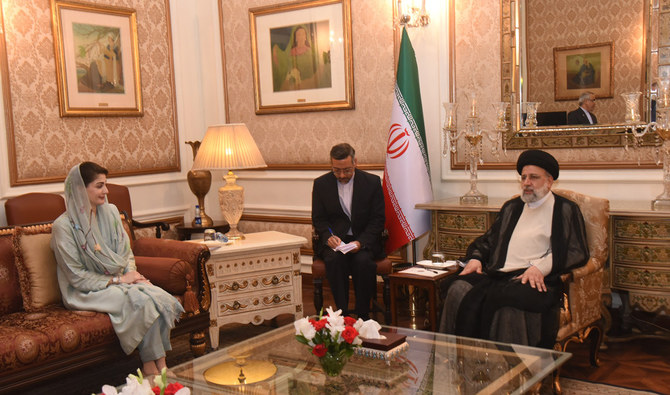KARACHI: Iranian President Ebrahim Raisi on Tuesday held meetings with top officials in Pakistan’s southern Sindh province as he arrived in the seaside metropolis of Karachi, following his visit to the eastern city of Lahore during three-day official tour of Pakistan.
Raisi arrived in Islamabad on Monday on a three-day official visit to Pakistan as the two Muslim neighbors sought to mend ties after unprecedented tit-for-tat military strikes earlier this year. The visit also comes as tensions are high in the Middle East after Iran launched airstrikes on Israel a week ago and Israel retaliated with its own attack on Friday.
Upon arrival at the Karachi airport, the Iranian president received a warm welcome from Sindh Governor Kamran Tessori and Chief Minister Murad Ali Shah. He was subsequently escorted to the mausoleum of Muhammad Ali Jinnah, where he paid homage to the founder of Pakistan. Stringent security measures were in place, with main thoroughfare closed and a public holiday declared in the port city.

Commuters ride past a welcoming billboard displaying an image of the Iranian president Ebrahim Raisi along a street in Karachi on April 22, 2024. (AFP)
Later, a reception was hosted in Raisi’s honor at the Sindh Chief Minister’s House, where Governor Tessori conferred upon him an honorary Doctorate in Philosophy (PhD) degree in recognition of his contributions to “strengthening bilateral ties between the two nations.”
“It’s a privilege for the University of Karachi to bestow this honorary degree upon the Iranian president,” Tessori was quoted as saying in a press statement.
He emphasized the importance of fostering strong relations among Muslim nations, according to the statement. The governor also invited the Iranian business community to invest in Pakistan, highlighting “the favorable and business-friendly environment within the country.”
Emphasizing the importance of enhancing relations between the two countries, CM Murad Ali Shah assured President Raisi of Sindh’s commitment to strengthening educational, cultural, social and economic ties with Iran.
“Murad Shah concluded by inviting Iranian brothers and sisters to explore investment opportunities in Sindh, emphasizing the region’s safe and attractive investment environment,” read a statement issued by Shah’s office.
Later, a dinner was hosted for President Raisi by the Pakistani business community.
Earlier in the day, Raisi visited the eastern Pakistani city of Lahore and began his trip by visiting the mausoleum of Allama Muhammad Iqbal, Pakistan’s national poet, whose literary works in the Persian language have garnered him widespread recognition in Iran.

Iranian President Ebrahim Raisi visits Iqbal's Mausoleum in Lahore and lays a wreath in honor of the renowned poet and philosopher of Pakistan on April 23, 2024. (Government of Pakistan)
He later met top provincial officials, including Punjab Chief Minister Maryam Nawaz and Governor Baligh-ur-Rehman. In his meeting with CM Nawaz, the two figures reaffirmed commitment to enhancing cultural exchanges and fostering people-to-people contacts, according to a statement issued from the Punjab CM’s office.
“The Chief Minister explained the measures taken in the province for socio-economic development and expressed a desire for close engagement with Iranian cities and provinces for mutual benefit and prosperity,” it read.
“President Raisi appreciated the rich cultural history of the city of Lahore and expressed admiration for the poet of the East, Dr. Muhammad Iqbal, who is revered in Iran as ‘Iqbal-e-Lahori’.”
The Iranian official’s visit is the first by any head of state to Pakistan after the South Asian nation’s February general elections and the formation of a new government headed by Prime Minister Shehbaz Sharif.
On Monday, Raisi held delegation-level meetings in the Pakistani capital as well as one-on-one discussions with the prime minister, president, army chief, chairman senate and speaker national assembly.
He also witnessed the signing of eight MoUs and agreements covering different fields including trade, science technology, agriculture, health, culture, and judicial matters. These include an MoU on the establishment of the Rimdan-Gabd Joint Free/Special Zone; on cooperation between the Ministry of Cooperative Labour and Social Welfare of Iran and the Ministry of Overseas Pakistani and Human Resources Development of Pakistan; on judicial assistance and legal cooperation at the ministry levels; on cooperation for animal hygiene and health; on mutual recognition in the field of quarantine and phytosanitary; and on the promotion of culture and films.
“The economic and trade volume between Iran and Pakistan is not acceptable at all and we have decided at the first step to increase the trade volume between our two countries to $10 billion,” Raisi said at a joint press conference with Sharif.
The interior ministers of Pakistan and Iran also met on Monday and discussed border management to prevent smuggling and drugs trafficking, and “decided in principle to ban terrorist organizations in their respective countries,” state news wire APP said.

Governor Punjab Muhammad Balighur Rehman (right) shakes hands with the Iranian President Ebrahim Raisi in Lahore, Pakistan on April 23, 2024. (Government of Pakistan)
“The two sides agreed on a joint plan of action to deal with the menace of terrorism being a common problem, with further improving mutual support and exchange of intelligence information.”
A security agreement regarding this decision would be signed “at the earliest,” APP added.
Pakistan and Iran have had a history of rocky relations despite a number of commercial pacts, with Islamabad being historically closer to Saudi Arabia and the United States.
Their highest profile agreement is a stalled gas supply deal signed in 2010 to build a pipeline from Iran’s South Fars gas field to Pakistan’s southern provinces of Balochistan and Sindh.
Pakistan and Iran are also often at odds over instability on their shared porous border, with both countries routinely trading blame for not rooting out militancy.
Tensions surged in January when Pakistan and Iran exchanged airstrikes, both claiming to target alleged militant hideouts in each other’s countries. Both sides have since then undertaken peace overtures and restored bilateral ties.













